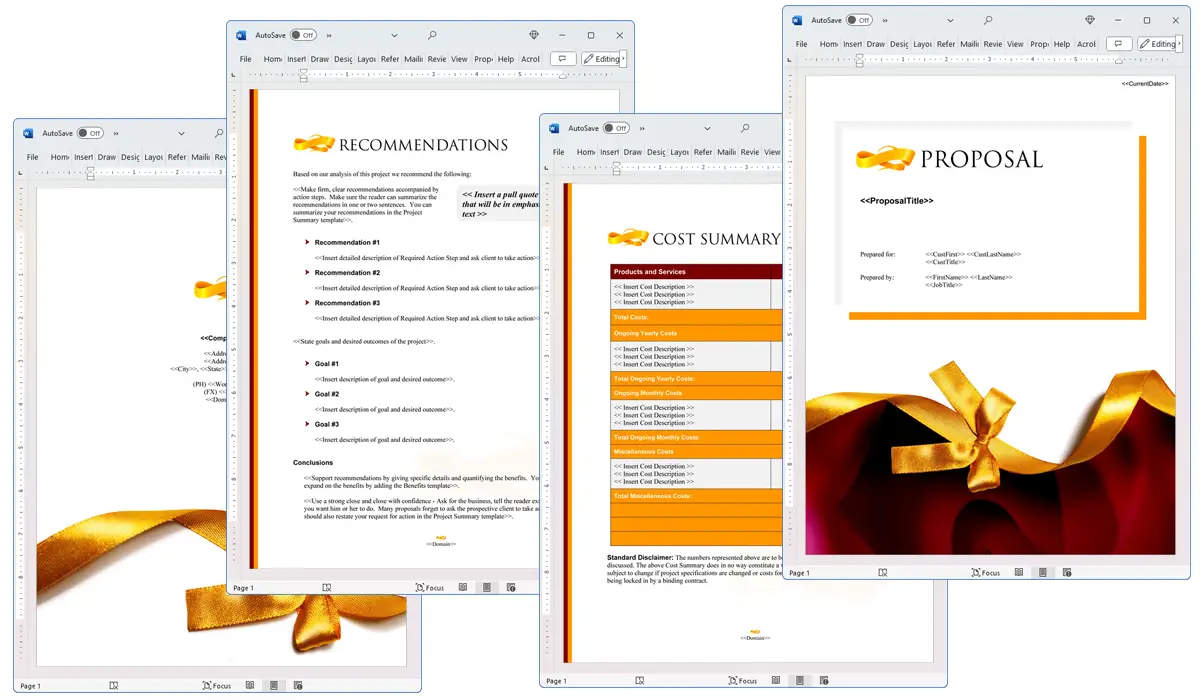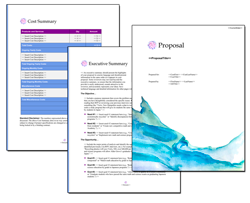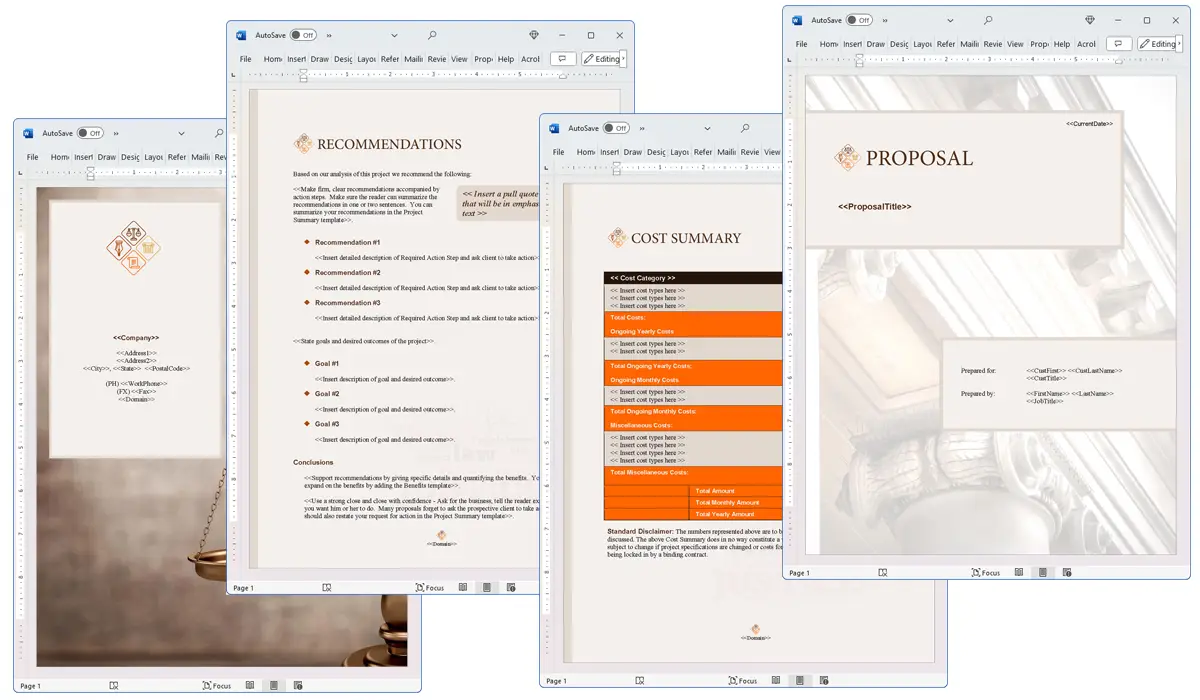What is the Assumptions chapter used for?
Proposal Kit Professional Bundle adds more design themes, all six Contract Packs,
a project management library, and Expert Edition software.

Illustration of Proposal Pack Elegant #7
We include this Assumptions chapter template in every Proposal Pack, along with thousands more. You assemble this chapter with others in various combinations to create custom-tailored business proposals, plans, reports, and other documents. Proposal Packs apply custom visual designs to the templates, giving the final documents a consistent professional finish.
 DOWNLOADABLE, ONE-TIME COST, NO SUBSCRIPTION FEES
DOWNLOADABLE, ONE-TIME COST, NO SUBSCRIPTION FEES
Overview of the Assumptions Chapter
In creating a business proposal, clear communication is paramount. One important part of a proposal is the Assumptions chapter. This chapter helps clarify the foundational beliefs and conditions upon which the proposal is built. By detailing the assumptions, the proposal writer sets the stage for understanding what factors are considered given and how they impact the proposal's scope, budget, timeline, and overall execution.
How is the Assumptions Chapter Used?
The Assumptions chapter is used in a business proposal to outline all the underlying assumptions that are integral to the understanding of the project's framework and its execution. This includes presumptions about project timelines, available resources, client responsibilities, and other critical factors that are considered to be true for the purposes of the proposal. Clearly stating these assumptions helps prevent misunderstandings and aligns the expectations between the proposing company and the client.
What is Included in the Assumptions Chapter?
Typically, the Assumptions chapter includes:
- Preexisting conditions: Any existing infrastructure or conditions that will influence the project's execution.
- Timeline assumptions: Expected start dates and significant milestones presumed in planning.
- Resource availability: Assumptions about the availability and accessibility of necessary resources, including human resources, technology, and materials.
- Client commitments: What the proposal assumes the client will provide or undertake during the project.
- Regulatory and compliance factors: Assumptions related to legal and regulatory conditions impacting the project.
Use Case Examples for the Assumptions Chapter
The Assumptions chapter can be particularly useful in various scenarios, such as:
- RFP Responses: Ensuring that all parties have a common understanding of the starting conditions and what is expected from each side.
- Technology Implementation Projects: Outlining assumptions about the existing IT infrastructure and the readiness of the organization to adopt new technologies.
- Construction Proposals: Detailing assumptions regarding the site conditions and availability of materials.
- Marketing Campaigns: Assuming certain market conditions and customer behaviors.
- Event Planning: Including assumptions about venue availability, participant numbers, and support services.
Key Takeaways
- The Assumptions chapter is vital for setting the stage for proposal expectations and execution.
- It helps in aligning understanding and preventing potential conflicts by stating what is assumed to be true.
- Key components include details on resources, timelines, client responsibilities, and existing conditions.
- This chapter is crucial across various types of proposals, from technology implementations to event planning.
- Clearly articulating assumptions enhances the clarity and effectiveness of the proposal, making it easier for clients to make informed decisions.

Illustration of Proposal Pack Artsy #9
 What Our Clients Say
What Our Clients SayI am a website developer and marketing consultant. I have used Proposal Kit business proposals for 9 years and find their latest version improved even more."
M3Company
 4.7 stars, based on 841 reviews
4.7 stars, based on 841 reviewsRelated Chapters
Samples Using the Assumptions Chapter
Document Layouts Using the Assumptions Chapter
- Business Case Document
- Extensive Service Sales Proposal
- Bankruptcy and Foreclosure Crisis Report
- Health and Beauty Business Funding Proposal
- Business Loan Application Proposal
- ERP (Enterprise Resource Planning) System Proposal
- EMV Chip and Pin Migration Proposal
- HHS Federal Government Grant Proposal
- Retrofit Project Proposal
- PhD Thesis Proposal
- Medical Support Project RFP Response Proposal
- Business Plan Funding Request Proposal
- Event Reschedule Proposal
- Custom Software Development Proposal
- Sales and Inventory System Development Proposal
- Business Development Proposal
- Community Action Report to Fight Police Abuse

The Assumptions chapter and other chapters are integrated into a Word document as illustrated here in the Proposal Pack Justice #2 design theme. There are hundreds of design themes available, and every design theme includes the Assumptions chapter template.
A proper business proposal will include multiple chapters. This chapter is just one of many you can build into your proposal. We include the complete fill-in-the-blank template in our Proposal Pack template collections. We also include a library of sample proposals illustrating how companies in different industries, both large and small, have written proposals using our Proposal Packs. This template will show you how to write the Assumptions.
We include a chapter library for you to build from based on your needs. All proposals are different and have different needs and goals. Pick the chapters from our collection and organize them as needed for your proposal.
Using the Proposal Pack template library, you can create any business proposal, report, study, plan, or document.
 Ian Lauder has been helping businesses write their proposals and contracts for two decades. Ian is the owner and founder of Proposal Kit, one of the original sources of business proposal and contract software products started in 1997.
Ian Lauder has been helping businesses write their proposals and contracts for two decades. Ian is the owner and founder of Proposal Kit, one of the original sources of business proposal and contract software products started in 1997.By Ian Lauder
 Published by Proposal Kit, Inc.
Published by Proposal Kit, Inc.


 Cart
Cart
 Facebook
Facebook YouTube
YouTube X
X Search Site
Search Site